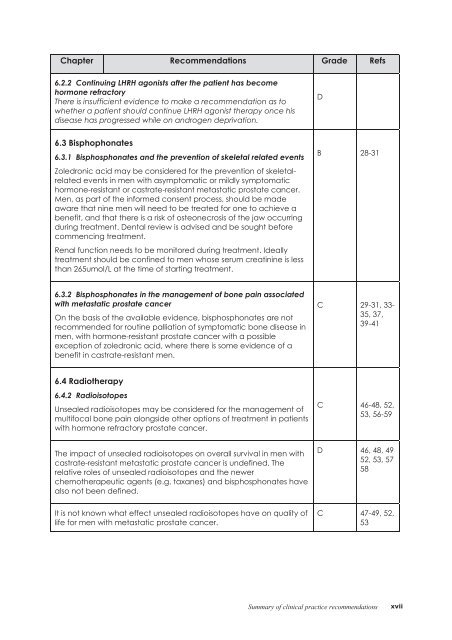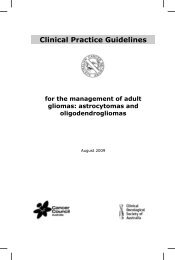Clinical Practice Guidelines for the management of locally advanced ...
Clinical Practice Guidelines for the management of locally advanced ...
Clinical Practice Guidelines for the management of locally advanced ...
Create successful ePaper yourself
Turn your PDF publications into a flip-book with our unique Google optimized e-Paper software.
Chapter Recommendations Grade Refs<br />
6.2.2 Continuing LHRH agonists after <strong>the</strong> patient has become<br />
hormone refractory<br />
There is insufficient evidence to make a recommendation as to<br />
whe<strong>the</strong>r a patient should continue LHRH agonist <strong>the</strong>rapy once his<br />
disease has progressed while on androgen deprivation.<br />
6.3 Bisphophonates<br />
6.3.1 Bisphosphonates and <strong>the</strong> prevention <strong>of</strong> skeletal related events<br />
Zoledronic acid may be considered <strong>for</strong> <strong>the</strong> prevention <strong>of</strong> skeletalrelated<br />
events in men with asymptomatic or mildly symptomatic<br />
hormone-resistant or castrate-resistant metastatic prostate cancer.<br />
Men, as part <strong>of</strong> <strong>the</strong> in<strong>for</strong>med consent process, should be made<br />
aware that nine men will need to be treated <strong>for</strong> one to achieve a<br />
benefit, and that <strong>the</strong>re is a risk <strong>of</strong> osteonecrosis <strong>of</strong> <strong>the</strong> jaw occurring<br />
during treatment. Dental review is advised and be sought be<strong>for</strong>e<br />
commencing treatment.<br />
Renal function needs to be monitored during treatment. Ideally<br />
treatment should be confined to men whose serum creatinine is less<br />
than 265umol/L at <strong>the</strong> time <strong>of</strong> starting treatment.<br />
6.3.2 Bisphosphonates in <strong>the</strong> <strong>management</strong> <strong>of</strong> bone pain associated<br />
with metastatic prostate cancer<br />
On <strong>the</strong> basis <strong>of</strong> <strong>the</strong> available evidence, bisphosphonates are not<br />
recommended <strong>for</strong> routine palliation <strong>of</strong> symptomatic bone disease in<br />
men, with hormone-resistant prostate cancer with a possible<br />
exception <strong>of</strong> zoledronic acid, where <strong>the</strong>re is some evidence <strong>of</strong> a<br />
benefit in castrate-resistant men.<br />
6.4 Radio<strong>the</strong>rapy<br />
6.4.2 Radioisotopes<br />
Unsealed radioisotopes may be considered <strong>for</strong> <strong>the</strong> <strong>management</strong> <strong>of</strong><br />
multifocal bone pain alongside o<strong>the</strong>r options <strong>of</strong> treatment in patients<br />
with hormone refractory prostate cancer.<br />
The impact <strong>of</strong> unsealed radioisotopes on overall survival in men with<br />
castrate-resistant metastatic prostate cancer is undefined. The<br />
relative roles <strong>of</strong> unsealed radioisotopes and <strong>the</strong> newer<br />
chemo<strong>the</strong>rapeutic agents (e.g. taxanes) and bisphosphonates have<br />
also not been defined.<br />
It is not known what effect unsealed radioisotopes have on quality <strong>of</strong><br />
life <strong>for</strong> men with metastatic prostate cancer.<br />
D<br />
B 28-31<br />
C 29-31, 33-<br />
35, 37,<br />
39-41<br />
C 46-48, 52,<br />
53, 56-59<br />
D 46, 48, 49<br />
52, 53, 57<br />
58<br />
C 47-49, 52,<br />
53<br />
Summary <strong>of</strong> clinical practice recommendations<br />
xvii



